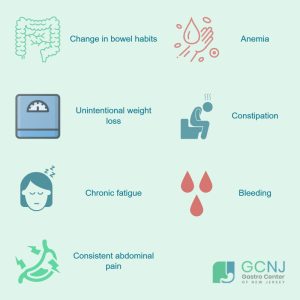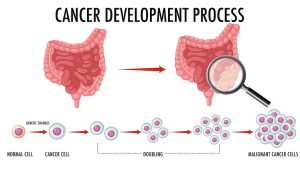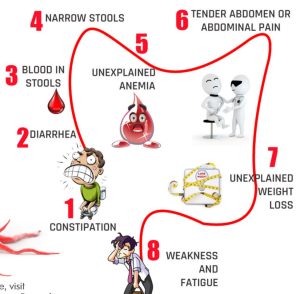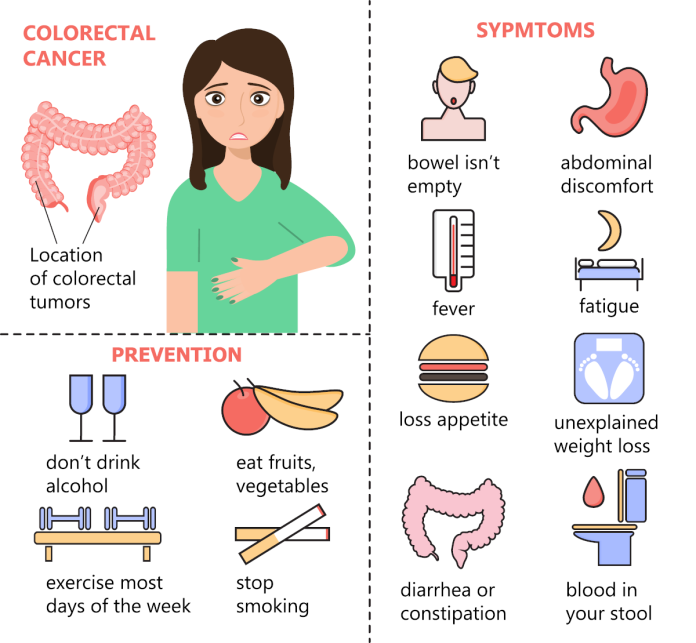A study published in the Journal of the National Cancer Institute indicates that there are four telltale signs that can occur up to two years before a colon cancer diagnosis in young people. They include:
- Stomach pain
- Rectal bleeding
- Persistent diarrhea
- Anaemia
Colon cancer is also called colorectal cancer, a disease in which cells in the colon or rectum grow out of control.

Stomach pain
A patient, Ashley Mellen, says when she experienced stomach pain that radiated up toward her ribs, she thought it was digestion troubles. As the pain intensified, she underwent a CT scan.
“They pulled me into a little room and they said, ‘You have tumors in several places in your abdomen. You have cancer. We’re going to be admitting you to the hospital,’” Mellen revealed.
By this time, it was stage 4. While she underwent treatment, she passed away in early April, about a year after her diagnosis.
39-year-old Melissa Ursini’s abdominal pain struck her in waves radiating across her lower belly for an hour at a time. The pain eventually became constant and felt like period cramps. At first, she thought it might be gynaecological and scheduled a visit with her OB-GYN. She soon learned she had stage 2 colon cancer.
After surgery and chemotherapy, Ursini is cancer free. “I’m hoping that people realize (colon cancer is) not an old person’s disease,” she said.
Rectal bleeding
When Joshua Sanchez noticed blood after using the bathroom, he didn’t worry at first.
“I thought I had a hemorrhoid,” the 38-year-old said. “I felt like something still wasn’t great because I had noticed some blood.”

Follow up tests confirmed that he had blood in his stool, and he was eventually diagnosed with stage 4 colon cancer and underwent treatment for it.
When Carly Barrett noticed blood in her stool, she looked up her symptoms online and thought that a variety of conditions could be the cause, including hemorrhoids, ulcerative colitis, irritable bowel syndrome or Crohn’s disease.
“I was like, I’m 24. I’m too young. Cancer doesn’t happen to people at this age. Cancer doesn’t happen to people who don’t have it in their family,” Barrett, now 28, said. “But it does.”
She was diagnosed with stage 3 colon cancer, which was changed to stage 4 after her first chemotherapy treatment failed and the cancer spread to her liver. She joined a clinical trial and no longer has evidence of disease.
Persistent diarrhoea
While Natalie Phelps, then 38, felt pain in her lower back, pelvis and around her rectum while pregnant, her doctor suspected it would wane after she gave birth. Six weeks after giving birth, she went from being constipated to having loose stool. She visited numerous doctors and her primary care physician even thought therapy could help her symptoms. Finally, she underwent a colonoscopy and learned why her bowel habits had changed so much.
“I went into the colonoscopy thinking I was going to wake up with colitis or Crohn’s — something not fun, but not cancer,” Phelps said. “I woke up from the colonoscopy and they said, ‘We found a very large tumor and it is almost 100% cancer.”

It was stage 4 colon cancer and Phelps is still undergoing treatment for it.
Anaemia
More than 20 years ago, few people were thinking about colon cancer in young people. When Candace Henley fainted and visited the hospital to see what was wrong, doctors noticed she had a low blood count. They ran several tests on the then 35-year-old and she was diagnosed with stage 2 colon cancer.
“It just didn’t make sense to me … that I had cancer,” the now 55-year-old founder and CEO of the colorectal cancer nonprofit The Blue Hat Foundation said. “(The doctors) were shocked as well because here I am this 35-year-old, and I’m presenting with colon cancer.”
When blood tests showed that Al Thomas was anaemic, he felt worried. His cousin had been diagnosed with colon cancer and Thomas wondered about his risk. At first, doctors assured him he would be safe because he was only 38 and his cousin wasn’t a first degree relative. Still, Thomas wanted to be sure and took an at-home colon cancer test.
“That came back showing microscopic traces of blood in my stool,” Thomas said. “When you hear colon cancer again it kind of sends you in a tailspin.”
Thomas underwent treatment and is now cancer free. He hopes that others learn from his experience and speak up when something seems wrong.
“You have to advocate for yourself,” he said. “You have to be diligent and follow up.”
This article was originally published in TODAY


